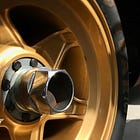Economics has no place in emotional decisions.
Unfortunately, some of our most emotional decisions are financial hammers, and we drop them on our thumbs without a second thought. What we drive and where we sleep are decisions rooted almost entirely in irrational fantasy. A humanoid AI whose prime objective is long-term financial stability would spend no more than $2,500 on any car and drive it until repairing it was literally impossible, then repeat that process until the end of time. Why? Math. But math doesn't sell cars, so advertising is positioned to appeal to our feelings instead of our brains. Even when we know the math, our dumbass hearts invent every bias imaginable to trick our brains into justifying a less responsible purchase.
Even the most frugal among us still land quite a few shades more emotional on the decision spectrum than our robotic benchmark. But this is what makes life worth living. We get to play. And daydreaming about our dream house or putting a poster of a Porsche 959 on our wall as a teenager are playful acts. We only run into problems when we don't learn that sacrificing play is a fundamental part of being a responsible person.
A cruel paradox lies in our lust for play being at its highest when we can afford it the least. In our teens and twenties, most of us are broke and clueless but our lives are transitioning from the oppressive "no" farms of childhood to the unbridled open-endedness of adult independence. There's an unopened box of ice cream sandwiches in the freezer and I'm alone in my apartment at 7pm on a Saturday night. What am I supposed to do, NOT eat them for dinner?
I believe our nature has more to do with how we behave in the absence of authority than I'd like to admit. Some kids with strict parents continue to follow their guidance when they leave the nest. Meanwhile, their sibling goes apeshit and never looks back. They had the same parents, the same towns, the same schools, and the same cafeteria food. The difference? Their very individual and specific preternatural attraction to chaos.
My introduction to the world of credit card debt was the purchase of a car. It was black with a tan interior. It had five-spoke chrome wheels. Popping open the hood revealed a beautiful engine. The badge? Ferrari.
Here, I have a picture:
My debt journey began not by buying more house than I could afford or spending too much on a real car, but by buying one useless 1/16 scale model from the Sharper Image at my local mall. The employee was surprised I had a credit card at such a young age and said something I still haven't forgotten: "Be careful with this." I laughed it off, utterly certain that I was too smart to spend more than I had. But if that was the case, why wasn't I paying in cash? It was only $20. But that's what I wasn't smart enough to realize. These $20 purchases I could afford were the body blows that softened my constitution, making me vulnerable to the right hook of larger purchases looming in the future. By that point, I was already accustomed to circumventing the part of my brain responsible for responsibility. Since I could afford those smaller things, I became conditioned to defer those thoughts until the bill came. And by that point, it was already too late.
In all, I bought only a handful of those model cars before I owned up to how frivolous they were, but by then the pattern was established and the damage was done. It ultimately took a car accident in my thirties and the subsequent insurance settlement to close the book on my debt for good. Not to mention the generosity of my family who helped me get up off the mat when I needed it. However, neither of those was my doing, and most people aren't as lucky.
I still have the Ferrari. It sits in an acrylic case in my office as a reminder of the importance of small habits. Our small habits will one day grow up and leave the house. It's up to us to make sure we raise them to be good-natured.
From The Archives
Are you enjoying this newsletter?
💌 Forward it to a friend and suggest they check it out.
📲 Share a link to this post on social media.
Also, quick survey: What keeps you reading?








